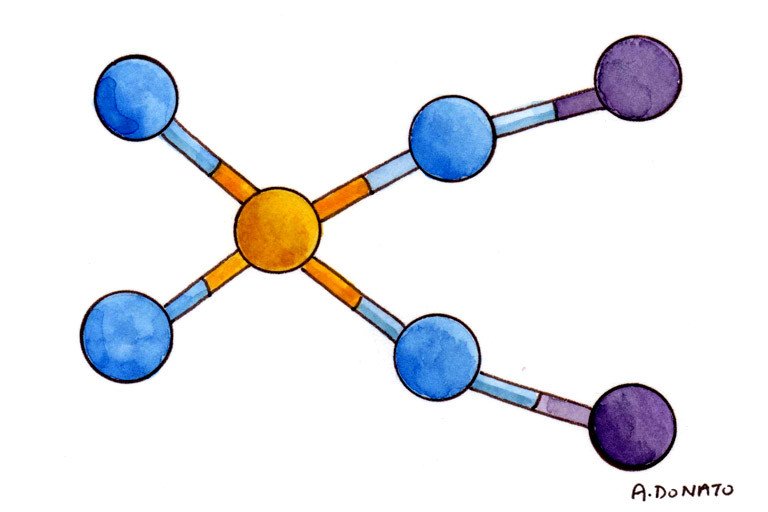
Common Names
- Sehydrin
- Hydrazine
- Hydrazine monosulfate
- HS
For Patients & Caregivers
Tell your healthcare providers about any dietary supplements you’re taking, such as herbs, vitamins, minerals, and natural or home remedies. This will help them manage your care and keep you safe.
What is it?
Hydrazine sulfate is not an approved cancer treatment. It has been shown to increase the incidence of some cancers.
Hydrazine sulfate is a chemical used in industrial manufacturing of agricultural chemicals and rocket fuel. Supporters make the false claim that hydrazine sulfate limits the ability of tumor cells to make glucose, an important source of their energy, from body stores. In theory, this would also prevent the accelerated breakdown of protein that causes wasting in patients with advanced cancer. However this effect, or that it could slow tumor growth, has never been shown in humans. Furthermore, hydrazine sulfate has been shown to increase the incidence of breast, lung, liver, and skin cancers.
Hydrazine sulfate is commercially available in the US, but it is illegal to use it as a cancer therapy. It is classified as a potential carcinogen by the Department of Health and Human Services.
What are the potential uses and benefits?
- To prevent wasting, maintain weight, and increase appetite in patients with advanced cancer
There is no scientific evidence to support this use. - To treat cancer
Clinical trials do not support this use, and one actually showed that hydrazine sulfate was worse than no treatment at all.
What are the side effects?
- Nausea
- Itching
- Dizziness
- Sedation
- Nerve damage
- Low blood sugar
- Insomnia
Case reports
- Isolated cases of liver and kidney failure and brain damage.
- Multiple basal cell carcinomas following extensive exposure to hydrazine sulfate.
- Acute liver injury following brief occupational exposure of only 30 seconds.
For Healthcare Professionals
Clinical Summary
A synthetic chemical (H4N2-H2SO4) primarily used in industrial manufacturing such as agricultural chemicals and rocket fuel, hydrazine sulfate has been purported to treat cancer, help maintain or gain weight, and ameliorate cancer-related cachexia.
Animal studies suggest that hydrazine is carcinogenic. In addition, several large randomized clinical trials failed to show benefit with hydrazine for cancer-related cachexia or to improve cancer survival (7) (8) (9) (10).
Hydrazine sulfate is classified as a potential carcinogen by the US Department of Health and Human Services. Potential adverse effects include nausea, pruritus, dizziness, peripheral neuropathies, hypoglycemia, and insomnia (4). Case reports have detailed fatal hepatorenal failure (5) and encephalopathy (6).
Purported Uses and Benefits
- Cancer
- Cachexia
- Maintain or gain weight
Mechanism of Action
Hydrazine sulfate is thought to inhibit phosphoenolpyruvate carboxykinase, an enzyme involved with the Cori cycle for gluconeogenesis from anaerobically metabolized lactic acid. Hydrazine therapy is used to antagonize the inappropriate activation of gluconeogenesis pathways, reduce excessive gluconeogenesis, and improve glucose tolerance particularly in patients with cancer and cancer-related cachexia (1). It is also a weak monoamine oxidase inhibitor (3). Inhibition and stabilization of glioblastoma cell growth was seen in vitro and in animal models (4), but significance in humans is unknown. Hydrazine sulfate appears to have no effect on prostate cancer cell lines in vitro (2).
Adverse Reactions
Common: Nausea, pruritus, dizziness, sedation, peripheral neuropathies, hypoglycemia, insomnia (4)
Case reports
- Hepatorenal failure (5) and encephalopathy (6) with use of hydrazine sulfate.
- Multiple basal cell carcinomas: With extensive exposure to hydrazine sulfate in a 68-year-old man (11).
- Acute liver injury: After only 30 seconds of occupational inhalation and dermal exposure in a 22-year-old man. He also experienced immediate eye itching, dizziness, and choking sensation that resolved upon leaving the site, but liver abnormalities lasted for 10 days.